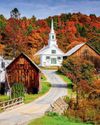
Palm trees, Bombay Sapphire waters, coral gardens as vibrant as stands of tropical fruit... these are the things that tempt most visitors to the Philippines, the 'Pearl of the Orient. But beyond these paradisical images lie many indigenous cultures.
The Philippines is an archipelago of 7,641 islands scattered across the Philippine Sea, on Asia's eastern edge. Human remains have been found dating back at least 50,000 years, long before Austronesians began arriving, followed by Chinese traders. However, it was the Spanish who left an indelible mark. Arriving in 1521, they claimed the islands, named the colony for Prince Phillip, and introduced their language and Catholic religion. The British briefly occupied Manila in the 1760s but the archipelago remained Spanish until the US took over in 1899. During the Second World War, the Philippines was under Japanese occupation. It finally became independent in 1946.
However, despite centuries of conflict and colonialism, the original inhabitants' way of life is still palpable. There are around 110 ethnic groups, speaking 170 languages. Indigenous culture is particularly strong on Luzon island, which is home to groups such as the Ifugao, Kankanaey, and Kalinga. Even today, exploring Ifugao rice terraces involves perseverance and long bus rides across the Cordillera. These mountains - along with the Kalinga's reputation as headhunters - meant its people resisted Spanish invasion.
"My family are Kankanaey," says Elvira Masferré Sana, who runs Masferré Museum in Sagada; it's dedicated to her late father, photographer Eduardo Masferré, who documented the tribes in the 1950s. "Men wore loincloths and women wore woven tapis," explains Sana. These are still worn during began rituals.
Esta historia es de la edición June/July 2022 - Issue 221 de Wanderlust Travel Magazine.
Comience su prueba gratuita de Magzter GOLD de 7 días para acceder a miles de historias premium seleccionadas y a más de 9,000 revistas y periódicos.
Ya eres suscriptor ? Conectar
Esta historia es de la edición June/July 2022 - Issue 221 de Wanderlust Travel Magazine.
Comience su prueba gratuita de Magzter GOLD de 7 días para acceder a miles de historias premium seleccionadas y a más de 9,000 revistas y periódicos.
Ya eres suscriptor? Conectar

Vermont, USA
The Wanderlust team relocated to New England for part of this issue, as we explored a lush state filled with outdoor escapes, historic towns... and lashings of maple syrup

Unique North America
See a side to the USA and Canada beyond the big cities and discover incredible stories and special wildlife with our pick of the trips

The call of the Rockies
From historic ski lodges to rustic backcountry cabins and a mock-Scottish castle, we pick the stays in Canada's Rocky Mountains that make the most of their setting

A new dawn for the Garifuna community
When the Garifuna people settled in Belize, they had to carry their traditions and culture with them; now a new trail is inviting visitors to explore this heritage through local communities

On the edge of history
In south-west Colorado lies the largest archaeological preserve in the USA, a series of vast cliff dwellings whose residents 'vanished' overnight. But was the answer to their disappearance in plain sight?

Tigers burning bright
As India celebrates 50 years of its Project Tiger conservation scheme, we visit the reserves of Madhya Pradesh to see how its success has impacted a tiger population that once looked in danger of disappearing

SEASON'S GREETINGS
From fiery fall foliage to art fairs and harvest festivals, opens up a wealth of across the USA and Canada autumn experiences

Waking a sleeping GIANT
A slow drive along the North Wales Way, from the English border to Anglesey, reveals not only a land of incredible local food and castles, but a region that is slowly reimagining itself

The rebirth of old JEDDAH
As efforts to restore Al-Balad, Jeddah's historical district, take hold, we get an exclusive peek at how art and culture are taking centre stage

Star-studded escapes
Wilderness, history and wildlife combine at some of Britain's most iconic stargazing sites, as more and more travellers are looking to the heavens